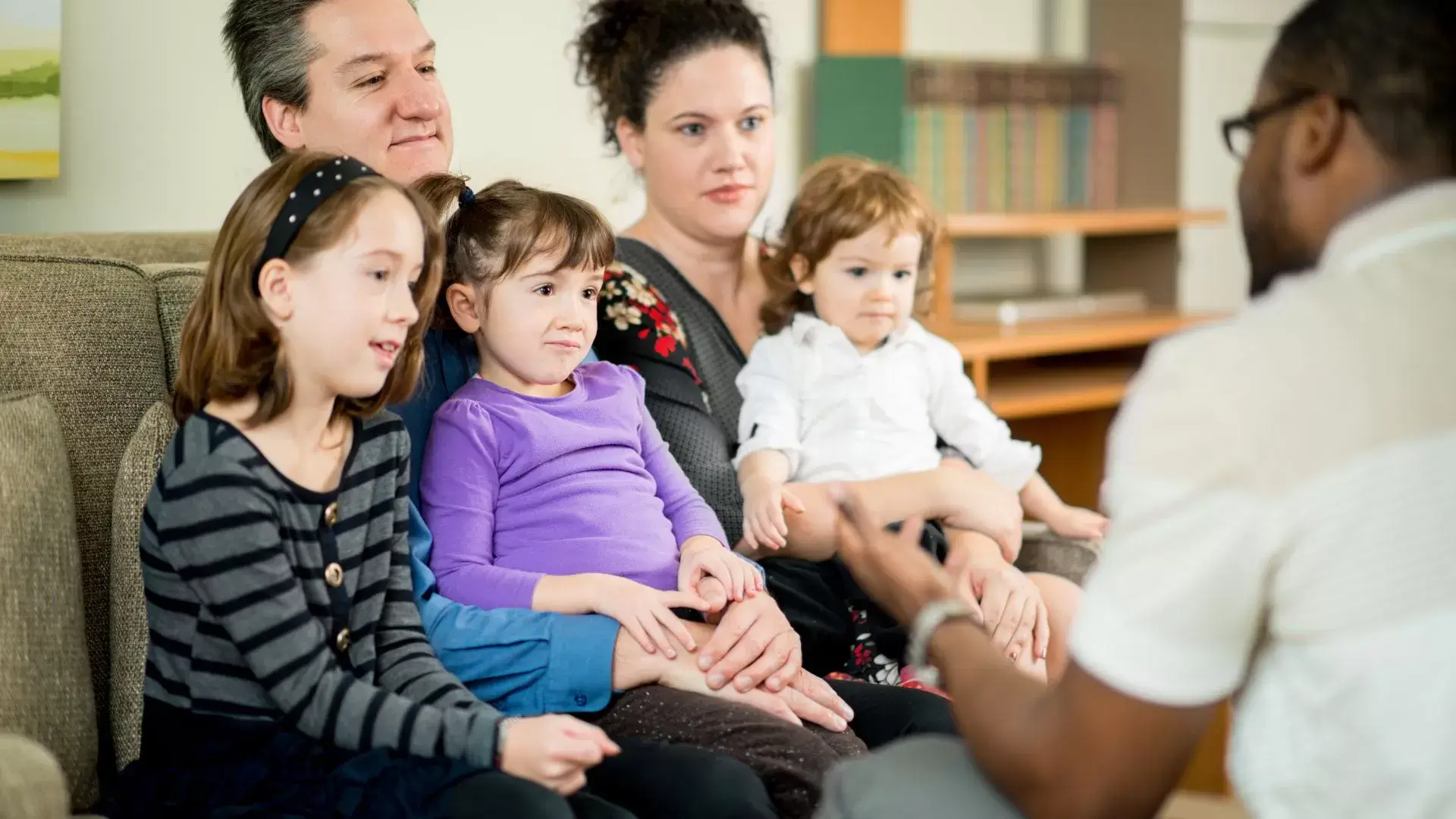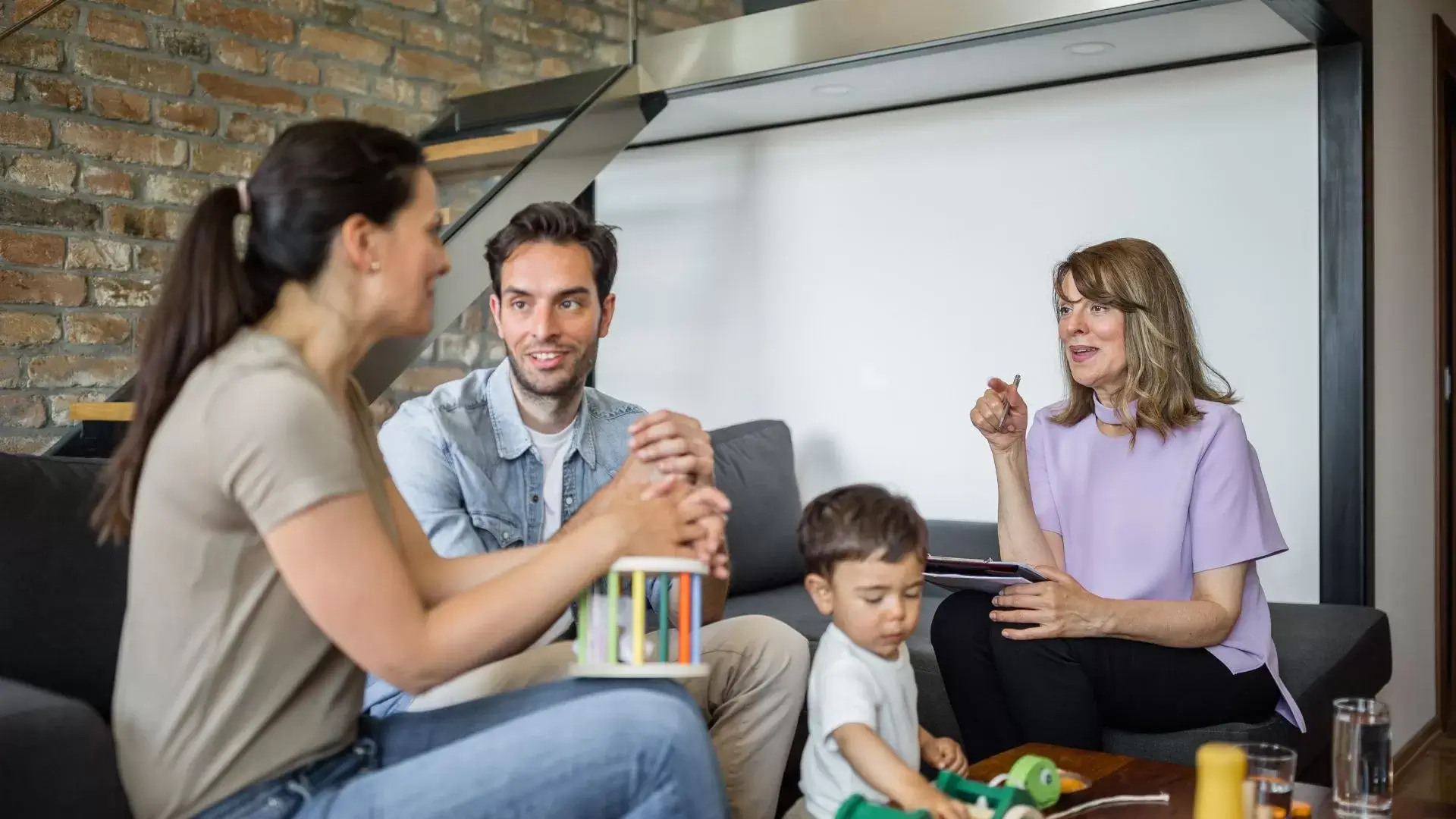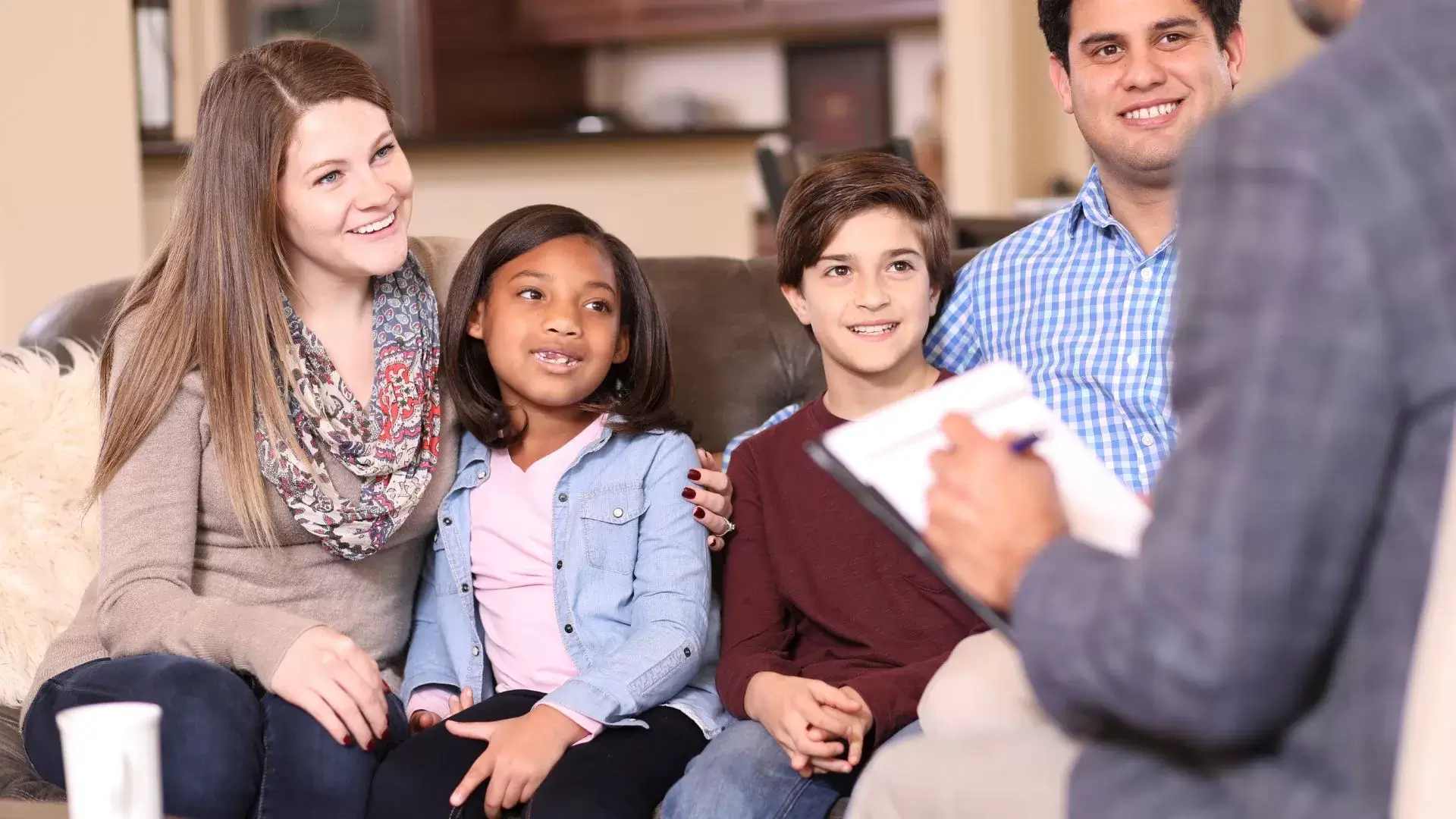Family Counseling Psychotherapy
Family counseling psychotherapy offers us a supportive space to navigate complex challenges together. It focuses on enhancing our communication skills and deepening emotional connections. In therapy, we explore our unique family dynamics, address issues like conflict resolution, and strengthen our bonds. By fostering open dialogue, we can better understand each other and find collaborative solutions to our concerns. This process not only aids in healing but also empowers us to face life’s changes as a united front. If we’re looking for ways to improve our family relationships, there’s much more to explore about the benefits of this journey.

About Our Psychotherapy Counseling Services
At our practice, we offer compassionate psychotherapy counseling services designed to support families in managing their unique challenges and fostering healthier relationships. We recognize that family dynamics can be complex, and that’s why our family therapy sessions focus on enhancing communication skills and providing emotional support to each member.
Through our family counseling services, we aim to improve family relationships by addressing issues collaboratively. We help families develop effective conflict resolution strategies, empowering them to navigate disagreements with respect and understanding. Our therapists are skilled in guiding families through their specific concerns, whether it’s enhancing family emotional health or ensuring overall family wellness.
We believe that every family has the potential for growth and healing. Our approach includes assisting families in problem-solving, helping them to identify their strengths and work through challenges together. By fostering a safe space for open dialogue, we encourage families to express their feelings and experiences. We’re here to support you on this journey, knowing that every step taken towards understanding and connection contributes to a healthier family environment. Together, we can work towards building a stronger, more resilient family unit.
Understanding Family Dynamics and Roles
Understanding family dynamics and roles is essential for us to effectively address the unique challenges each family faces, as these dynamics shape how members interact and relate to one another. Through family dynamics therapy, we can explore the underlying family behavior patterns that contribute to both harmony and conflict. By recognizing each family member’s role, we can promote healthier family communication and foster a supportive environment.
When we engage in family interventions, we aim to enhance family understanding and strengthen familial bonds. This process encourages us to identify areas where emotional balance may be lacking and to address them collaboratively. We can work together to develop strategies for family conflict resolution, ensuring that everyone’s voice is heard and respected.
Common Family Issues Addressed in Therapy
Many families grapple with a range of common issues that can benefit from therapeutic intervention, including communication breakdowns, conflict resolution, and managing life changes. In family counseling, we often encounter challenges such as parenting difficulties, where we work together to strengthen family communication skills. These challenges can strain our emotional well-being and create family conflicts that feel overwhelming.
Through various family therapy techniques, we can identify specific family issues and implement effective conflict resolution strategies. Whether it’s steering sibling rivalry, dealing with a major life change, or addressing differences in parenting styles, we learn how to build family resilience. This journey allows us to foster deeper connections and understanding within our family unit.
Additionally, family support services play an essential role in providing resources and guidance. By participating in family counseling, we often find that we’re not alone in facing these struggles. Together, we can create a safe space for open dialogue, empowering us to overcome challenges and nurture healthier relationships. In the end, it’s about enhancing our family’s emotional well-being and learning to support one another through life’s ups and downs.
The Importance of Communication Skills in Family Counseling
Effective communication skills are essential in family counseling, as they help us navigate conflicts, express emotions, and foster a supportive environment for everyone involved. By enhancing our family communication skills, we create pathways for understanding and empathy, which are fundamental for effective family conflict management.
In our counseling sessions, we often explore various family therapy approaches that prioritize open dialogue and active listening. These strategies not only assist in family problem resolution but also contribute to strengthening family bonds and emotional connection. When we communicate effectively, we cultivate family unity and promote a sense of belonging that can be transformative.
Additionally, family mediation plays a significant role in addressing misunderstandings and fostering collaborative solutions. With family guidance, we can learn to articulate our needs and feelings without fear, which is crucial for maintaining healthy relationships.
Ultimately, the family counseling benefits extend beyond the therapy room; they seep into our daily lives, enriching our interactions and nurturing a harmonious family dynamic. By emphasizing communication, we empower ourselves and each other to face challenges together, reinforcing our commitment to each other’s well-being.

Resolving Family Conflicts Through Counseling
Maneuvering family conflicts can be challenging, but counseling offers us a structured space to address our issues and find constructive resolutions together. During our family counseling sessions, we can openly discuss the family behavior issues that often lead to misunderstandings. This safe environment encourages us to express our emotions and perspectives, fostering deeper family connection.
As we work towards resolving family conflicts, we can set clear family therapy goals that focus on effective communication and empathy. By implementing family intervention strategies, we learn to navigate our differences while respecting each other’s family values. This not only promotes family stress management but also nurtures an atmosphere of support and understanding.
Through family mental health support, we can better recognize the underlying factors contributing to our conflicts. By addressing these issues head-on, we aim for family harmony, ensuring that our relationships grow stronger. Ultimately, our commitment to this process allows us to cultivate resilience, leading to healthier dynamics within our family. Together, we can create a more peaceful and united family environment, where love and respect flourish despite the challenges we face.
Strengthening Family Bonds and Emotional Well-Being
Building strong family bonds is essential for our emotional well-being, as it helps us feel connected and supported through life’s ups and downs. Through psychotherapy counseling services, we can engage in family-centered therapy that fosters family healing and emotional growth. When we work together, we create a safe space for open communication, which can greatly reduce family stress.
Family therapy outcomes can be powerful, especially when we focus on family collaboration and conflict prevention. By addressing underlying issues and learning effective strategies, we can strengthen our relationships and deepen our understanding of one another. This is particularly beneficial for our teens, as family counseling for teens can provide them with the support they need to navigate their challenges while reinforcing their sense of belonging.
Additionally, having parenting support during this journey can enhance our ability to nurture and connect with our children. As we invest time and effort into strengthening our family bonds, we build a resilient foundation that promotes lasting emotional well-being. Together, let’s embrace the opportunities for growth and connection that family therapy brings, ensuring our family thrives in a supportive environment.
Parenting Support and Strategies in Family Therapy
Many families find that incorporating parenting support and strategies into family therapy can greatly enhance their ability to navigate challenges together. By focusing on effective parenting strategies, we can address various relationship challenges that may arise, especially in blended families. It’s crucial to foster family trust and communication as we develop our parenting skills through therapy.
In our sessions, parenting counseling provides us with the tools we need to tackle family life challenges head-on. We learn to identify underlying issues and implement practical family counseling tools that promote healthier interactions. These strategies not only help us manage day-to-day issues but also support our children’s emotional well-being.
The benefits of family therapy extend beyond just resolving conflicts; they empower us to create a nurturing environment. By practicing these parenting strategies, we can guarantee that our family thrives, regardless of the unique dynamics at play. Ultimately, therapy for family issues helps us grow together, reinforcing our connections and equipping us with the skills necessary to build a harmonious family life. Together, we can transform challenges into opportunities for deeper understanding and stronger relationships.
Addressing Blended Family Challenges
How can we effectively navigate the unique challenges that come with blending families while ensuring everyone feels valued and connected? Addressing blended family challenges requires us to understand the complexities of our new family structure. We may encounter intergenerational family issues, where differing parenting styles can complicate sibling relationships and family dynamics.
To foster a harmonious environment, we should prioritize open communication, allowing everyone to express their feelings and concerns. This approach not only strengthens our family mental health but also helps us collectively address any underlying family trauma. Utilizing family counseling techniques can provide support and guidance, helping us navigate these sensitive topics.
Participating in parenting workshops can also enhance our skills, equipping us to tackle specific challenges that arise in blended families. By focusing on therapy for parenting, we can learn effective strategies to foster connection and understanding among siblings, creating a nurturing atmosphere where all members feel valued. Remember, our journey as a blended family is a process, and with empathy and patience, we can build a resilient family structure that embraces each person’s unique experiences and perspectives.
Family Therapy for Emotional Healing and Trauma Recovery
Family therapy can play an essential role in our emotional healing and trauma recovery journey, providing a safe space for us to explore our feelings and experiences together. When we come together in a supportive environment, we can address the pain and trauma that may have affected our family dynamics. This shared experience often helps us feel less isolated in our struggles.
At Psychotherapy Counsellors, we can find compassionate therapists who specialize in guiding families through these challenging times. They understand that trauma can impact each of us differently, and they help us communicate openly about our feelings. This process not only fosters understanding but also promotes healing.
We’ve seen how sharing our stories can create connections and validate our emotions. By participating in family therapy, we can work on rebuilding trust and strengthening our relationships. If we’re ready to take that step and begin our healing journey. Together, we can navigate the complexities of our emotions and support one another as we recover from trauma, ultimately leading to a healthier, more resilient family unit.
Managing Family Stress and Promoting Resilience
Steering through the challenges of daily life can be overwhelming, but by implementing effective strategies, we can manage stress and build resilience together as a family. One key approach is open communication. Let’s create a safe space where everyone feels comfortable expressing their feelings and concerns. This fosters understanding and connection, helping us navigate tough times.
Another important strategy is establishing routines. By setting predictable schedules for meals, chores, and family time, we can create a sense of stability that calms anxiety. We should also prioritize self-care, both individually and collectively. Taking time for ourselves helps recharge our emotional batteries, making us better equipped to support one another.
Additionally, let’s practice problem-solving together. When challenges arise, we can brainstorm solutions as a team, empowering each family member to contribute. Celebrating our successes, no matter how small, reinforces our resilience.
Lastly, cultivating a sense of gratitude can shift our focus from stress to appreciation. By recognizing the positives in our lives, we strengthen our family bond and build a resilient foundation. Together, we can face whatever comes our way, growing stronger as a family unit.

The Role of Family Therapy in Mental Health Support
In times of emotional distress, engaging in family therapy can provide invaluable support, fostering understanding and healing among loved ones. We often find that mental health challenges can affect not just individuals, but the entire family unit. By participating in family therapy, we create a safe space where everyone can express their feelings and concerns without judgment.
Through guided discussions, we can identify patterns of behavior that contribute to stress and conflict. This process helps us to better understand each other’s perspectives, promoting empathy and compassion. We learn to communicate effectively, which can ease the burden of emotional pain and build stronger connections.
Family therapy also offers us tools to cope with the complexities of mental health issues. By addressing underlying issues together, we can reduce feelings of isolation and promote a sense of unity. It’s important to remember that seeking help as a family isn’t a sign of weakness; rather, it’s a courageous step toward healing.
Ultimately, we discover that by supporting one another, we can create an environment conducive to recovery and growth, fostering resilience in the face of adversity. Together, we can navigate the challenges and emerge stronger as a family.
Conflict Prevention and Problem-Solving Skills
How can we, as a family, develop effective conflict prevention and problem-solving skills to navigate our challenges together? First, we should create an open environment where everyone feels comfortable expressing their thoughts and feelings. By actively listening to each other, we can better understand different perspectives, which is essential for resolving conflicts before they escalate.
Next, we can establish ground rules for discussing disagreements. This might include taking turns speaking, avoiding blame, and focusing on the issue rather than personal attacks. When we approach conflicts with empathy and respect, we’re more likely to find common ground.
We can also practice problem-solving as a family. By brainstorming solutions together, we empower each other to contribute to the resolution process. This not only fosters teamwork but also helps us develop critical thinking skills.
Family Counseling for Teens and Adolescents
Family counseling for teens and adolescents can provide a safe space where we can explore our feelings and challenges together, fostering understanding and growth during this pivotal stage of life. As we navigate the complexities of adolescence, it’s common to feel overwhelmed or misunderstood. In family counseling, we can openly discuss our experiences, worries, and hopes, allowing us to feel heard and validated.
One key aspect of family counseling is improving communication. We might struggle to express ourselves or feel that our family doesn’t truly understand us. Through guided conversations, we can learn to articulate our thoughts and emotions, making it easier for our families to support us effectively.
Additionally, we can address specific issues like peer pressure, academic stress, or identity exploration. Understanding that we’re not alone in facing these challenges can be incredibly comforting. The counselor’s role is to facilitate understanding, helping us build stronger connections with our family.
Ultimately, family counseling can empower us as teens and adolescents to better manage our emotions and relationships. Together, we can create a more supportive and loving environment that nurtures our growth and development.
Benefits of Family Counseling for Long-Term Harmony
Building lasting harmony within our family can be greatly enhanced through the transformative process of counseling, where we work together to strengthen our bonds and resolve conflicts. By engaging in family counseling, we create a safe space to express our thoughts and feelings openly, which can lead to deeper understanding and empathy among us.
One key benefit is improved communication. We learn how to listen actively and articulate our needs without fear of judgment, fostering an environment of trust. Additionally, counseling helps us identify and address patterns of behavior that may be causing friction, allowing us to break free from cycles of negativity.
Through guided discussions, we can explore the root causes of our conflicts and develop effective strategies for conflict resolution. This proactive approach not only addresses current issues but also equips us with tools to handle future challenges more gracefully.
Ultimately, participating in family counseling cultivates resilience and unity, reinforcing the notion that we’re all in this together. By committing to this process, we pave the way for a more harmonious family life, enriching our relationships and enhancing our overall well-being.
Reach Out for Professional Family Counseling Services
Seeking professional family counseling services can be a vital step towards nurturing the harmony we’ve worked hard to achieve together. It’s not uncommon for families to face challenges that seem insurmountable, but reaching out for help can provide us with the tools and strategies needed to navigate these difficulties.
When we consider family counseling, we’re investing in our collective well-being. A trained therapist can offer a safe space where we can express our feelings and thoughts without judgment. They can help us understand the underlying issues that may be causing tension and guide us toward healthier communication patterns.
We might feel hesitant at first, but it’s important to remember that seeking help is a sign of strength, not weakness. By involving a professional, we’re acknowledging that we care about our family dynamic and want to improve it.
Let’s take that leap together, knowing that we don’t have to face our struggles alone. Professional family counseling can help us reconnect, rebuild trust, and ultimately foster a more harmonious family life. It’s a step worth taking for our collective happiness and growth.
Frequently Asked Questions
What Qualifications Should I Look for in a Family Counselor?
When we’re seeking a counselor, it’s essential to evaluate their qualifications. We should look for someone with a relevant degree in psychology or social work, along with proper licensure. Experience with our specific issues is key, too. It helps if they’ve had training in communication and conflict resolution. We might also want to check their approach to guarantee it aligns with our needs, creating a safe and supportive environment for everyone involved.
How Long Does Family Counseling Typically Last?
When we think about the duration of counseling, it often varies based on individual needs and goals. Typically, sessions can last anywhere from a few weeks to several months. We’ve found that most people benefit from attending weekly or bi-weekly sessions, allowing time for reflection and growth. It’s important to remember that everyone’s journey is unique, and what works for us might differ, so staying open and flexible is key.
Can Family Counseling Help With Addiction Issues?
Absolutely, we believe that counseling can play a significant role in addressing addiction issues. It allows us to explore the underlying factors contributing to addiction while fostering open communication and support among loved ones. Together, we can create a safe environment where everyone feels heard. By working through these challenges collectively, we can build healthier relationships and support one another in recovery. It’s a journey we can navigate together, and we’re not alone in this.
Is Family Counseling Confidential?
When we think about confidentiality in counseling, it’s essential to understand that our conversations are generally protected. We can share openly, knowing that what we discuss won’t be revealed without our consent. However, there are exceptions, like if someone’s safety is at risk. If we’re concerned about this, it’s always best to ask our counselor about their confidentiality policies upfront to guarantee we feel comfortable and secure in the process.
How Do I Know if My Family Needs Counseling?
When we’re wondering if our family needs counseling, we should look for signs like ongoing conflict, communication breakdowns, or emotional distress. If we’re feeling stuck, overwhelmed, or if our relationships seem strained, it might be time to reflect on professional help. We can also notice if changes in our lives, like loss or shifts, are affecting our dynamics. Trusting our instincts and seeking support can be a positive step toward healing and understanding.


